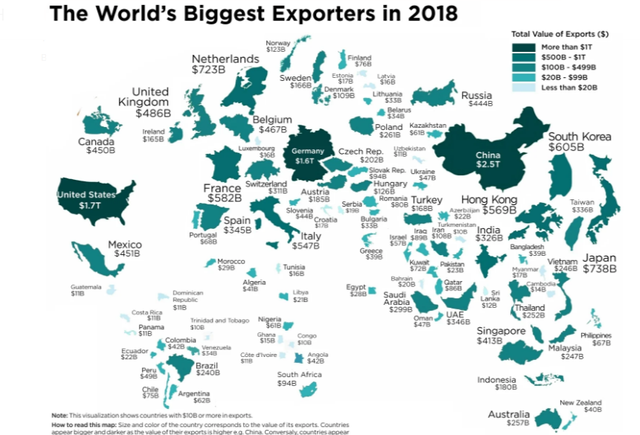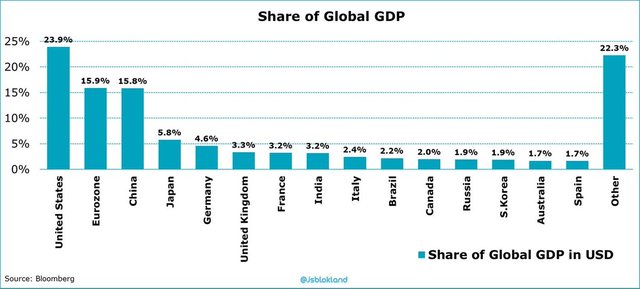
With the rejection of the gold security of national currencies, now each country (conditionally) decides how much money to print. As a result, the money supply is constantly growing, countries have large debts to each other, banks, and investors. With the development of the digital economy, it is possible to switch to an alternative world currency.
I am not an expert in mathematical calculations, I want to write my opinion. How in my opinion money will look in the future.
It seems to me that the value of national currencies should depend and be calculated depending on the aggregate of factors.

- Cost nat. the currency should take into account the contribution of each country to world trade. That is, how much this or that country has provided goods and services to the world market. For 100% you need to take the sum of all sectors of exported goods.
For example, China exports the most clothes, Russia exports the most gas, Saudi Arabia exports the most oil, Germany exports the most cars, the USA exports the most gadgets.
As a result, we take all the highest indicators for each sector of goods and calculate from them.
For example: a single country provides only tourism services, all other indicators in this country are close to zero relative to the highest rates in other countries.
If during the year the weather is bad for tourism, the country will receive very low budget revenues and the value of its national currency can sink, and very much.
But if the calculation will be made relative to the largest indicator of tourism, then the value of the country's national currency may decrease insignificantly, since this country was one of the leaders in the industry. Other indicators, which are described below, will also be taken into account. As a result, the value of the currency of this country will remain.

An example of calculating the first coefficient:

I’ll immediately make a reservation that if, for example, the tourism figure of $ 1 trillion is the highest for the last year and belongs to a certain country, then the indicators of less than 100 billion, that is, less than 10% of the largest, are not taken into account
China exports $ 1 trillion worth of clothing; let’s take this indicator as the highest in the world. The global apparel export figure is 10 trillion.
China exports $ 1 trillion of agricultural products, but the United States has the highest figure, for example, at $ 1.5 trillion (to calculate countries whose figure is below 150 billion). The global agricultural export figure is 50 trillion.

Kp - takes into account how many areas of the economy a particular country is represented. That is, the more segments represented by a particular country, the higher this ratio
The number of people. The more people living in a particular country, the lower the coefficient. Because there are more able-bodied people, and therefore more opportunities for the development of all sectors of the economy, and therefore a much larger country's budget relative to other countries.
The area occupied by the country. Also, the larger the area of the country, the lower the coefficient that is used to calculate the national currency. So there are more opportunities for agricultural development, infrastructure development, attracting investors.
The amount of resources in each country.
The GDP of each country per person.
The country's share in world GDP. If a country occupies less than 0.1% of global GDP, then a rising coefficient is applied in order to support the national currency of that country. If the country exceeds 0.1%, the usual calculation method is used.

So far I have just started writing an article, I will gradually add my thoughts and describe in more detail each type of coefficient that in my opinion should be taken into account when determining the value of nat. currencies especially countries with weak economies.
I agree with your opinion matrix; the digital economy and the creation of an alternative world currency would be a great option for countries that are economically affected and where most of their population is poor. From my point of view, I think that it would somehow bring benefits like those obtained from the digital economy based on cryptocurrencies that exists today; and that in fact it has been a very good option for inhabitants of countries mired in a difficult economic situation, such as the case of Venezuela.
Downvoting a post can decrease pending rewards and make it less visible. Common reasons:
Submit